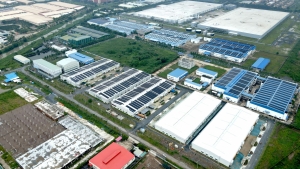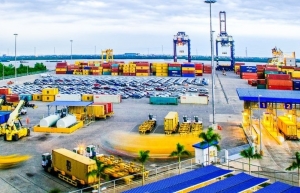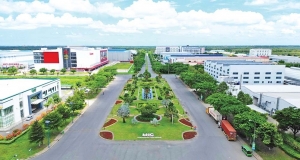Real estate developers pin hopes on eco-IP regulations
Long Duc Investment Co., Ltd., the developer of Long Duc Industrial Park (IP) in the southern province of Dong Nai, is working with relevant parties to study plans to build a green and smart IP project. The aim is to improve the efficiency of industrial waste treatment towards zero CO2 emissions, and energy saving.
 |
| Some industrial areas have already planned to adhere to various international sustainable regulations, ahead of official legislation in this country, Photo: Le Toan |
“We have had working sessions with provincial leaders and the Management Board of Dong Nai Industrial Parks on the proposal to implement a smart and green IP. This not only creates a competitive advantage for the IPs, but also contributes to improving environmental quality for the province’s IPs," said Ishii Hiroyuki, general director of Long Duc Investment.
Amata Long Thanh City Co., Ltd. is also outlining another eco-IP in Dong Nai that will ensure the waste treatment system uses smart technology.
Other industrial infrastructure developers in the area are interested in applying ecological criteria to transform development models, including Suoi Tre IP in Long Khanh and Nhon Trach 6 IP in Nhon Trach district.
While this increase in attention on eco-IPs was initially thanks to 2022's Decree No.35/2022/ND-CP on the management of IPs and economic zones (EZs), the Ministry of Planning and Investment (MPI) this May further proposed developing a specific law on IPs, aiming to create flourishing conditions to build eco-IPs that can attract high-quality investment capital flow. The proposal is awaiting the approval of the government.
According to Vuong Thi Minh Hieu, deputy director of the MPI’s Department for Economic Zones Management at a talk show held by VIR last week, one of the outstanding impacts of the 2022 decree was to encourage the development of new IP and EZ models.
“The decree adds types of specialised IPs, high-tech IPs, specialised zones, and non-tariff zones. Besides that, it supplies regulations to clarify the support and cooperation policies, criteria for identification, incentives, certification, order and procedures for registering for eco-IP certification,” Hieu said.
“At the same time, it specifically stipulates preferential policies for new types of IPs, including regulations on occupancy rate conditions not being applied when considering and approving investment planning for new model IPs,” Hieu added.
More specifics wanted
At the talk show, representatives of industrial real estate developers highly appreciated the expansion of regulations, especially the incorporation of rules on sustainable IPs. However, they consider the rules as an initial basis, opening the path for eco-IPs, and simultaneously emphasising the importance of developing a dedicated IP and EZ law.
“The development of eco-IPs is a mandatory trend, but this model needs a large amount of initial capital. Decree 35 has no specific regulations on the incentives and preferential loans for developers, so they face barriers in mobilising green finance,” said Van Nguyen, associate project manager at real estate company JLL.
The implementation of segments of new model IPs such as land clearance, the development of housing and accommodation for workers, the reuse of treated wastewater, and the installation of the renewable energy system face difficulties due to the overlap of the regulations in other laws, Van said.
“Many foreign investors are impatient when it comes to land clearance and other procedures, and they may look for opportunities in other countries. Thus, having a particular law on IPs and EZs to avoid overlap in regulations is an expected requirement,” Van added.
Pham Hong Diep, chairman of the board at Shinec, investor of Nam Cau Kien IP in Thuy Nguyen district of Haiphong, said industrial real estate developers like Shinec expect a new law soon.
“It would integrate the particular regulations to develop sustainable IPs as well as apply the circular economic model at parks so that there will not be overlap or dependence on other laws,” Diep said. “The business community is committed to accompanying the MPI and relevant authorities during the process to build the law and will contribute opinions based on practical experience to ensure transparency and objectivity.”
Boosting convenience
According to Diep, Nam Cau Kien IP has been applying a circular economy model since 2018. After the government issued Decree 35 and the Law on Environmental Protection, Nam Cau Kien identified changes to make and has met all the criteria for an eco-IP stated in Decree 35, as well as the criteria set for circular economy development.
“Decree 35 is just a sub-law document, thus when implementing segments of eco-IPs and circular economic models in IPs, industrial real estate developers face many barriers relating to the other laws. For example, the reuse of treated waste is regulated by the Law on Environmental Protection, the reuse of treated wastewater’s regulations depend on the Ministry of Agriculture and Rural Development,” said Diep.
According to Diep, the construction of housing and accommodation for workers is also a problem. A housing area based on eco-IP standards need many utilities, including convenience for workers.
“The problem is that the Law on Housing regulates that a room for 6-8 people in a dormitory just has one toilet, which is extremely inconvenient,” Diep explained. “However, industrial real estate developers can’t do anything because of the overlap with the regulation of the Law on Housing. Housing areas in a few IPs are often abandoned due to failure to meet workers' demands.”
Since 2020, the MPI has coordinated with the United Nations Industrial Development Organization (UNIDO) to implement an eco-IP intervention scheme, with a total budget of $1.82 million, which has been piloted in Ho Chi Minh City, Can Tho, Dong Nai, Danang, and Haiphong.
Among IPs selected for project intervention were Amata IP, DEEP C IP, and Hiep Phuoc IP. Technical support was also provided to other IPs involved in a previous UNIDO initiative.
Between 2015 and 2019, the MPI, UNIDO, and other donors worked to pilot eco-IP models in Ninh Binh, Danang, and Can Tho. As a result, 72 businesses implemented more than 900 energy-saving and clean production solutions, which helped them to save $3.3 million and simultaneously cut 32 kilotonnes of CO2 annually.
 |
 | Industrial parks increase supply of high-quality ready-built factories The strong development of the industrial real estate market has promoted the ready-built factory segment in the eyes of international and domestic manufacturers. |
 | No plain sailing for eco-IP conversion The creation of eco-industrial parks should increase competitiveness, but the implementation process is leaving developers with prolonged headaches. |
 | The pros and cons of IP relocations There are many old industrial parks located in or near densely developed and populated urban areas in Vietnam that fail to provide adequate environmental protection. Timothy D. Van Epp, fellow of the American Institute of Certified Planners, and Mai Nguyen of the American Planning Association’s International Division, explain why new rules or incentives may be needed to implement the government’s relocation policy. |
 | Capital flows strongly into industrial real estate As the economy is still facing difficulties, industrial real estate has become one of the most attractive sectors for investors. |
 | Businesses increase wishes for specialised industrial parks Vietnam’s industrial areas must evolve into more specialised types to meet the increasingly diverse needs of multinational tenants. |
What the stars mean:
★ Poor ★ ★ Promising ★★★ Good ★★★★ Very good ★★★★★ Exceptional
 Tag:
Tag:
Related Contents
Latest News
More News
- Construction firms poised for growth on public investment and capital market support (February 11, 2026 | 11:38)
- Mitsubishi acquires Thuan An 1 residential development from PDR (February 09, 2026 | 08:00)
- Frasers Property and GELEX Infrastructure propose new joint venture (February 07, 2026 | 15:00)
- Sun Group led consortium selected as investor for new urban area (February 06, 2026 | 15:20)
- Vietnam breaks into Top 10 countries and regions for LEED outside the US (February 05, 2026 | 17:56)
- Fairmont opens first Vietnam property in Hanoi (February 04, 2026 | 16:09)
- Real estate investment trusts pivotal for long-term success (February 02, 2026 | 11:09)
- Dong Nai experiences shifting expectations and new industrial cycle (January 28, 2026 | 09:00)
- An Phat 5 Industrial Park targets ESG-driven investors in Hai Phong (January 26, 2026 | 08:30)
- Decree opens incentives for green urban development (January 24, 2026 | 11:18)























 Mobile Version
Mobile Version